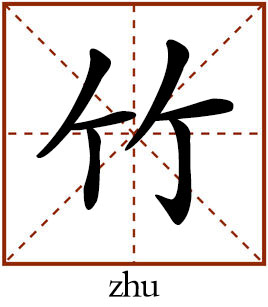Bamboo

Zhu (bamboo), a member of the “four gentlemen flowers,” represents many good virtues that a gentleman pursues in Chinese culture, including perseverance, integrity, uprightness and strong will.
竹密岂妨流水过,山高哪阻野云飞
zhumi qi fang liushui guo, shangao na zu yeyun fei
Zhumi refers to densely grown bamboo while fang and zu, both mean “to block.” Liushui means “water flow.” Shangao means “high mountains”; yeyun, drifting clouds. This proverb, taken literally, means that however dense the bamboo may grow, it cannot block the flow of water; however high the mountains are, they cannot stop the drifting clouds.
This proverb is used to encourage people to bravely confront difficulties and danger head-on.
胸有成竹
xiong you cheng zhu
Xiong refers to chest. In ancient China, the heart, inside the chest, was believed to be the organ responsible for thinking. You means “to have.” Chengzhu means “fully-shaped bamboo.” This idiom, taken literally, means having a full-shaped image of bamboo in one’s chest (mind).
This idiom originates from an article on bamboo painting by Su Shi (1037-1101) in the Song Dynasty. Su said that before painting bamboo, one should have a fully shaped image in his mind of the bamboo that he intends to draw. This idiom is now used to say that one should have a well-thought-out plan before doing things.
青梅竹马
qingmei zhuma
Qingmei means “green plum” Zhuma means “bamboo horses.” This idiom originates from a poem by Li Bai (701-762) in the Tang Dynasty. He described the wife of a merchant who wrote to his husband. The wife said “(When we were children) you came to me, riding on a bamboo stick for a horse. We chased each other around the railings of the patio, playing with the branches of green plum trees.”
This proverb is used to express a pure form of friendship formed in childhood, especially between boys and girls. It is also used to describe the relationship between lovers who grew up together and knew each other since they were children.

 PRINT
PRINT CLOSE
CLOSE